MISHA MANSOOR INTERVIEW – PERIPHERY (2012)
July 31st, 2012 in Interviews by Ivan Chopik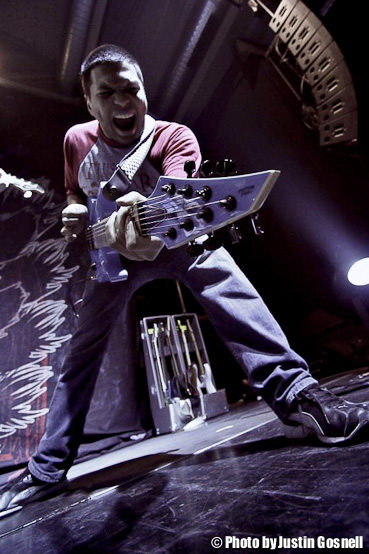 Since their influential debut album release in 2010, Periphery have morphed from a fledgling young group with an eclectic blend of styles into a modern progressive metal powerhouse. After undergoing a number of lineup shifts and touring the world several times over, including a direct support run with the mighty Dream Theater, the sextet from Bethesda, Maryland arrived at their second release, Periphery II: This Time It’s Personal.
Since their influential debut album release in 2010, Periphery have morphed from a fledgling young group with an eclectic blend of styles into a modern progressive metal powerhouse. After undergoing a number of lineup shifts and touring the world several times over, including a direct support run with the mighty Dream Theater, the sextet from Bethesda, Maryland arrived at their second release, Periphery II: This Time It’s Personal.
This album declared a new chapter for Periphery, revealing a familiar, yet more refined sound that continues to push the boundaries of the styles it engulfs. I had the opportunity to sit down and catch up with the band’s founder and mastermind, Misha Mansoor at the Fort Lauderdale, Florida stop of the 2012 Summer Slaughter tour:
IC: At the time of our first interview in April 2010, Periphery [debut album] had just dropped. A lot has happened for you in the years since then. In broad terms, how has your life changed, both personally and professionally?
MM: That album made Periphery a real band and gave us our career so far. It’s pretty much responsible for where we are right now, which is really cool. It had this slow and steady kind of growth over the last few years.
You know, we lost a few members. We lost Tom [Murphy, Bass] and Alex [Bois, Guitar], but we gained Mark Holcomb [Guitar] and Nolly [Adam Getgood, Bass] and we also have Jeff [Holcomb] filling in on bass right now and filming the documentary, so he’s also getting footage of all this, which is great.
So we met a lot of cool people and I think our band is stronger as a result. We were able to collaborate a lot more when it came to writing the second album. It’s just been a steady progress as a business, so I’m glad for that. I’m stoked.
IC: How’s your day-to-day life changed from the SoundClick days?
MM: Well, now for one I can’t post music up quite as freely as I did before. For a while I really wanted to, but the truth is that, the SoundClick was always just kind of, whatever I was writing at that point in time… I’d put it out there and that’s what it would be and maybe I would update it when I’d have a better version of the song.
Nowadays, if I do that, then everyone is just going to be like, ‘oh, we’ve already heard this before,’ so now whenever I write something, as much as I would love to share it with everyone, we have to keep it to ourselves. That was actually kind of hard at first, because I really like just being able to give everything out, you know? I think, because of this, everyone will hear a lot more new material on the actual album. I could have posted the demos for all the songs that weren’t on the SoundClick for this second album and I feel like the response would have all been a little different. They’d all heard demos beforehand so, I’d say it’s definitely changed in that way.
We’re in a bandwagon now, which is kind of cool. We don’t necessarily do this for every tour, but it’s cool to be able to do this for certain tours rather than the van, which you know we were in for a few years… and we’ve done these summer tours in a van which is very, very difficult. It’s very taxing.
IC: I remember you guys had your bunk setup in the van. Four people in the back, two in the front. [Check out some footage of this setup from our friends at DigitalTourBus.com HERE]
MM: Yeah, that’s something that Jake [Bowen, Guitar] built… well, Jake and Justin [Gosnell], actually. It started off as a flat bed and then we upgraded it to bunks, eventually. That was cool, but it was also just terrifying. It’s nice to not to be completely scared for your life every night [laughs].
IC: Well, you’ve paid your dues so far and now you’ve got this [bandwagon], so that’s awesome.
MM: We definitely appreciate this, because we can compare it to how different it was from the vans.
IC: Periphery II: This Time It’s Personal broke the Billboard Top 50 – congratulations! How did that measure up against your expectations? Were you surprised? Were you hoping for more? Did you expect less? What was your thinking going into this?
| Click play above to watch the video of this interview. |
MM: A lot of you guys watching may not be very aware of what record sales mean anymore. And to be fair, it changes every year, because people don’t really buy records and these numbers may not sound like a lot. I remember when our first record came out, we [sold] 4,500 copies first week and a lot of people were giving us props and a lot of people were very impressed that we did that for our debut.
I didn’t understand why, because it was such an arbitrary number to me and I didn’t have the context on how our peers did, but that was a very good number for our debut album, for it being our first one. I think everyone on our team was expecting more like 1,000 or 2,000 sales on first weekend.
As I’ve explained online, first week sales are a very important thing for a band, because it’s how the industry places you and judges where you stand; things like guarantees (how much you get paid every night), what kind of tours you get offered, and where you’ll place on the tour (where you’ll actually be playing [in the lineup]) are determined and in a lot of cases negotiated with the first week sales…
At the end of the day, it actually determines how much money you’re going to make because of your guarantees. If you do more first week [sales], you are going to get higher guarantees. It’s just basically an antiquated way of judging a band, but it’s the only way they look at it, or one of the few ways they really look at it. That does really affect where you’re going to stand on your album cycle and I think us having good first week sales on our first album did a lot of good for us. I mean, I know it did.
It landed us all sorts of endorsements, helped us with our guarantees and to get good tours. I was expecting this time around to get maybe 8,000. I was like ‘if we do 8,000, I’ll be so stoked,’ because that was about double what we did last time and I’d have been really happy. Our management was like ‘we think 8 to 10 would be cool’ and I was like ‘10? That’s not going to happen.’
When I heard we almost did 12,000, I actually texted our manager and I was like ‘check that number,’ because that can’t be right, you know? He triple checked for me and it was, so I was like ‘wow.’ It really took us aback and we really have to thank everybody for supporting, because that number is obviously just a reflection of what you guys did and how you supported us, so it really means a lot. Thank you very much.
IC: You recently announced you are going to be collaborating with Nolly on a production company [Top Secret Audio]. Can you tell us a little more about that idea and what each of you brings to the table in the company?
MM: Nolly has been a huge part of this band, even though it’s never been official, and he’s been one of my best friends. We’ve always worked on production and engineering together, but he’s always had kind of the [strength] in the engineering side of things, because he’s so meticulous with everything and he learns and wants to understand why everything is the way that is.
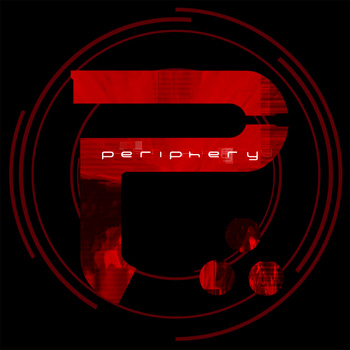
Periphery II: This Time It’s Personal (Album Cover)
I was more of the kind of guy who just jumped in and did everything by ear and figured things out that way. So my learning process was a lot longer than his, because it’s just sort of my style to just jump in and figure it out from there, while he kind of takes a step back and wants to understand why and how things are the way they are.
I feel like as a producer I can bring a lot to the table. I’m pretty happy with my mixes for the most part, but I never felt blown away or I’ve always felt like there’s another level that could be reached, and Nolly is the person that can help me do that. Nolly is very strong with the engineering side, but he feels like his weakness is the producing side of things, so it just made a lot of sense.
IC: You two complement each other.
MM: We complement each other very well. What we can do is just take a band that has even nothing at all and kind of write the album with them if need be, but at least do all the pre-production and then properly record them after the fact; just from inception to complete finished product we can completely handle a band. That was the idea behind this production team.
He was engineering and co-producing on [Periphery II: This Time It’s Personal] and that should give you a sense of the kind of stuff we can do, you know? If you will, I did the first album myself so the difference in sound and everything between the first and the second is going to be the difference in sound between my productions and the production team. That would be a good way to gauge what we’d be able to do.
IC: Taylor Larson [Oceanic Recording] was the official mix engineer on the album, but you and Nolly also contributed. What were your contributions like as far as the engineering and the mix?
MM: We went to Taylor for the drums and the vocals. We wanted to do live drums, and that’s the aspect that Nolly and I were kind of not as familiar with. We were also after very specific guitar and bass tones that Taylor really was out of his comfort zone with. The idea was that we’d handle the guitars and the bass.
Spencer [Sotelo, Vocals] has become quite the producer and he actually works with Taylor and at Taylor’s studio producing bands and their vocals. He’s a Pro Tools wizard and all that. He has all these creative ideas, so we knew that between Spencer and Taylor doing the vocals, that they would just get it done, so we didn’t even concern ourselves with that. This division of labor made it very easy to focus on just these aspects and getting them just right.
Taylor absolutely nailed the drum sound; we’re so happy with that. We mic’d up cabs; there were mics on everything this time. The first album was all ‘in the box;’ the only mic was for vocals. This time there’s mics oneverything! That was kind of out of our comfort zone and we worked with that. At times it might have felt like there were too many cooks in the kitchen, but ultimately we put a lot of work into it and we got the mix exactly the way that we wanted it.
With this production team, because we don’t have a studio yet, we probably would have whoever we’re recording, record at Taylor Larsons,’ because he gets incredible drum sounds. That would be part of it; outsourcing the drums to there and probably have Spencer do vocals, too, because he does fantastic work.
IC: As far as the guitar tones, you’ve said many times you used your [Fractal Audio] Axe-Fx II, but this time you were running it through a EVH 5150 III, using the head as a power amp.
MM: I have one of those heads and I love it to death. We needed a power amp and its the only tube power amp I have, so we tried it out and it sounded fantastic. We ran that out to a Mesa [Boogie] oversized cab and put a bunch of mics on it… don’t remember exactly which ones, but a [Shure SM57], a [Shure] Beta 57…
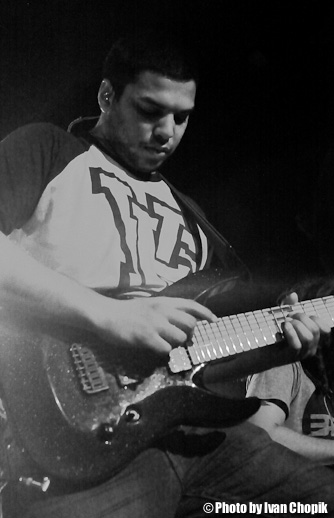
IC: I thought I saw a [Sennheiser MD] 421 in there…
MM: I don’t know if we used a 421.. we might have used a 421, actually… I forget. We wanted to create something unrepeatable, because technically with all the tone-matching now, you could kind of just get the first album tone… technically you could dial it in, EQ it in, and process it the same and you’d have exactly the same thing.
Here there are so many variables that I don’t think even we could recreate it, you know? It’s the room, the placements of the mics, placement of the cab in the room, what was in the room… so many factors. I’d say one of the most difficult things was actually creating a consistent guitar tone throughout the recording. So many times we kind of lost it and had to find it again and it came back a little differently.
I don’t think you’d notice in the context of the album too much but it was a real headache on our part, because we wanted this unrepeatable aspect, but it was kind of unrepeatable to ourselves even in the studio even with most of the variables being static. I don’t know necessarily that we will go that route in the future, because it’s not necessarily that it even sounded better; it was just something unique and it was a learning experience. We all learned a lot.
IC: I was wondering about how you came to think of going that route. Do you see yourself incorporating more tube amps in your live rig or other recordings?
MM: In the live rig – no. Recordings – maybe. For the studio, I feel like you should have all the options that you want and when we record we’ll just do DI’s and re-amp and see what sounds best. The Axe-Fx is a tool – it’s a means to an end, but it’s not something I’d use, just because I have to use it – I don’t. Even the guys at Fractal understand that.
For touring, it’s just the most practical thing ever. It sounds exactly the way I want our live guitar tone to be. The fact that you can just put it in a carry-on and take it overseas and that’s your whole rig… that’s kind of unbeatable. For those of you who don’t tour, you normally have to rent backline, which costs money and it’s a pain. You have to rent all the gear you use, so the very fact that you save money and it’s all in your bag, it’s right there… that goes a long way.
Until I have someone carrying and setting up my gear, I probably would never be considering using a tube rig or a more complex rig. Right now, we have very little gear. I think you made a comment that we have nothing on stage.
IC: Yeah, you have…. drums.
MM: Yeah we have drums, we have in-ears, and our [Apple] MacBook does all of our switching for us, so we can just play and stand anywhere we want. We have wireless Line6 packs as well, so we’re not committed to any area of the stage and there’s nothing on the stage, so that’s kind of cool.
IC: Over the years of listening to your songs, [I’ve noticed that] as a guitar player, you always come up with some new [playing approach], whether it’s a tapping technique, some kind of hammer-on thing you put into your riffs, or a new tuning. Is there anything in particular that you’re working right now on as a guitar player, that you’ve discovered recently?
MM: We’re always messing with tunings, which is something I always regret doing in the long run, because it just means we have to bring more guitars. There’s more tunings on this new album, too, so it can be a headache. The only thing I really experimented with was just doing a bit of slap guitar and that’s in ‘Make Total Destroy.’ That was on a whim, because we were just messing around with playing the slap bass under that part and we’re like ‘that sounds cool,’ and then we we’re like ‘what if we did that on the guitar?’ and that sounded really cool, too.
| Jeff Holcomb’s Summer Slaughter 2012 Documentary. |
I don’t know how much I would integrate that [into my playing], because I’m not particularly good at it, you know? My approach to writing is really just, once again: everything is a means to an end. It’s all about getting that idea out there, so I would never seek out techniques just to show the techniques off. It would have to serve the purpose of the song.
Any time I’m tapping or doing whatever, it’s because that tapping line sounded cool. It wasn’t because I was like ‘I really need a tapping lick or sweeping lick.’ Maybe hybrid picking would be cool [to get into], but I feel like that’s way over my head right now. If there’s one thing I’ve worked on a lot, it’s probably my vibrato. Definitely worked on getting my vibrato more 80′s… more wide, even… 1,2,3 – out kind of thing. And my alt picking, because I’ve always been really weak with my alt picking.
IC: I remember you mentioned that last time.
MM: It’s something that I’ve been wanting to work on. I got some killer tips from John Petrucci, so that went a long way.
IC: Can’t get better advice than that.
MM: Yeah. He’s a good teacher, too. So yeah, that’s what I’ve been working on.
IC: Speaking of John Petrucci and Dream Theater, you guys were planning to work on your next album, the concept album, at the time you got the offer for the Dream Theater tour, which youhave to take…
MM: Yeah. You have to take it… [laughs].
IC: That being said, the work on that album got pushed back, so what’s the status on that and how far did you guys get into it?
MM: I think it got pushed back even further now, because as we have been discussing what we can do with it, and the scope of the project has gotten a lot bigger as we’ve been fleshing it out. The whole motivation of this project, at least now, is that we’re going to write backwards to what we’re used to, so we’re going to be out of our comfort zone and be on our toes. Normally, what we would do is, we’d just write a song… like one of us would write a song, or we’d write a song together. The vocals come later and the lyrics come later.
This time around, the story will come first and that’s what we’ll be sort of scoring to. I want the music to be very appropriate to what’s going on and thematic, and that’s going to force us to flip it around and look at it based off the story and the lyrics as the first thing we approach, rather than the last thing.
I just think it can be a lot of fun. Because the story has gotten kind of fleshed out and is a little bit more in-depth and we realized we can get more in-depth with it. The scope of the project is a lot bigger and I don’t know when it’ll be done. I will say it is the next thing we are working on and the next album we put out will be the concept album.
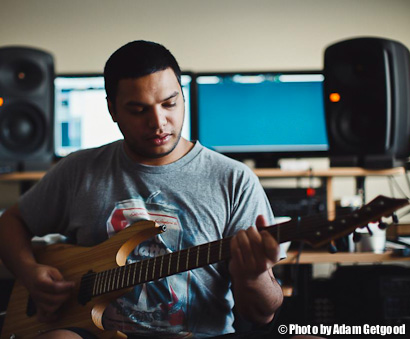 IC: One of my favorite early Periphery tracks is ‘Inertia‘ and I know that was meant to be a part of the bigger picture of songs. Is it going to be part of this album?
IC: One of my favorite early Periphery tracks is ‘Inertia‘ and I know that was meant to be a part of the bigger picture of songs. Is it going to be part of this album?
MM: That’s definitely planned for it. Once again, we have to make everything fit and that does fit in with the theme, lyrically. I want to say ‘yes,’ but then I don’t want it to not work out and be like ‘you said yes.’ I’d say there’s a good chance it will be on there.
IC: What are the plans for the remainder of the year? You have the Summer Slaughter tour right now. What’s going on after that?
MM: Believe it or not, I feel like we’re halfway through this tour, but we’ve got like a month left… it’s a long one. After that, we get a month off at home, then we’re heading out on the road to a UK / Europe tour with Between The Buried And Me and The Safety Fire.
That’s going to be good times, because we’ve become good friends with the guys from Between The Buried And Me on this tour and we’ve toured with the guys from The Safety Fire a bunch of times… good buddies. This is going to be a great time one way or another, and then after that we don’t really have anything planned as of yet. There’s some stuff being discussed other than this cruise… this Mayhem cruise. I don’t know if you know about that?
IC: Taking off from Miami, right?
MM: Right, so we might catch you then. Unless you’re going to be on the cruise, right?
IC: You’ll probably catch me if I’m on the cruise then…
MM: I’ll definitely catch you if you’re on the cruise… You’ll probably be too drunk to film.
IC: Everything is going to be out of focus slightly, right?
MM: It should be an accurate representation of what the cruise looks like for everybody else.
IC: Everything is B-roll [laughs].
MM: Exactly [laughs]. That’s got Gojira on it. I don’t know, actually, if Lamb of God is still playing that anymore, because of that whole horrible unfortunate situation [Singer Randy Blythe’s arrest in the Czech Republic]. A bunch of other bands, I think Born of Osiris is going to be there, which always means it’s going to be a party. That’s the only thing we’ve got… kind of a vacation on a boat, that I guess could be called work by some stretch of the imagination, but really, really won’t be…
IC: Playing a couple shows and doing some partying.
MM: On a cruise…. We’re going to be working hard! [laughs]
IC: Last time I asked you for some advice for young upcoming bands and the main point you made was about patience – about taking the time to do things right. A couple of years have passed… is there another piece of advice that, over these years you’ve come to realize and you’d like to share?
MM: That’s definitely one aspect… the patience thing is true as ever, if not more true. I don’t know if I went into this the last time, but it’s a business and you should treat it like it’s a business. You really should. We’re a small business… that’s what we are by definition. We take our numbers very seriously and we have sales goals we’re trying to hit and gross earnings we are trying to hit. We pay our taxes and we have an accountant and a business manager. These are very important things… it’s important to manage your money.
I see a lot of bands that don’t do that. Money has this way of slipping through your fingers when you commit it to memory, and with the amount of information that comes in with a band especially as you get bigger and bigger…. it’s a lot to manage. Either manage it very carefully yourself or have a business manager because, often times, even though you are paying a business manager a percentage, if you have mismanaged money, you actually lose more by having it mismanaged, than what you’d pay a business manager to have it well-managed, and to have your stuff under control and be able to look and see numbers on how you’re doing, financially.

Misha Mansoor & Marc Okubo at their 2010 Guitar Messenger interview.
This is a small business first and foremost, and if you don’t treat it with that kind of respect, you won’t be capitalizing on it at all and it could be the thing that destroys you. Just be very responsible with your money, because there is very little of it going around in this industry, especially in this scene. The little that you get needs to go a long way and if you manage it carefully, it can go a lot longer and do a lot more for you.
IC: In our 2010 interview with you and Marc Okubo [Veil of Maya, Guitarist], you guys were talking about the idea of getting to a point where you could completely focus on [your music] and not be dependent on other jobs. Have you gotten to that point now?
MM: Not yet, no. Believe it or not, we haven’t yet. We’re still at it. You know, some people might look and be like ‘oh you know, you are on this bandwagon right now and it’s expensive… it’s something you pay for. Why not do it in a van?’ If we did it in a van, we’d make a lot more money, but one of the things a lot of people take for granted, is that the less responsibilities you have to take… because when you are starting off in a band, you are doing everything – from merch, to driving, to every aspect… the more crew you can take out, the less you have to be responsible for, the better shows you can put out.
That is just an undeniable fact that every band will tell you is the truth and once you perform at a certain level, you can’t take it back. You can’t all of a sudden be tired all the time… of course if one of our guys… like Matt [Halpern, Drums] likes to drive a lot. If he’s driving all night, he’s not going to play as well the next day as he did on a night with good sleep.
Something like this, although it may look like it’s a luxury, really isn’t in some ways, because it enables us to deliver a certain standard of show that we really wouldn’t be able to, especially halfway through a tour if we were in a van or something like that. As you make more money, you have to spend more money. You have to make your show bigger and better. It becomes hard to net that money at the end of a tour. There’s a lot to be paid out. We’re slowly getting to the point where the money is getting a bit more substantial, but we still have to work.
IC: You’ve managed to accumulate a nice collection of high end guitars over the last couple of years. As you’ve said yourself ‘it’s more than the sum of its parts that makes a great guitar.’ So what is ‘more than that sum’ in those guitars that you look for?
MM: Honestly, it comes down to the most simple thing… I would say, a connection. Those of you who have played a guitar or those who play guitar and have tried a bunch of guitars know exactly what I’m talking about. Doesn’t matter about specs, doesn’t matter about anything. Sometimes you just pick up a guitar and it just puts a smile on your face and you can’t put it down or sometimes you just pick up a guitar and just riffs happen… ideas happen. I call it mojo… you could call it whatever you want… or ‘more of than the sum of its parts…,’ but that’s what it is.
The guitars that I love are from builders that seem to be able to consistently put out [quality] guitars. Every manufacturer, I’m sure, can make like one of those guitars, but can you do it consistently, can you do it every time? Even in the custom market you get flukes. Sometimes you get awesome guitars, sometimes you get not so great guitars. They could have amazing woods and pickups and construction and all that, but it’s just not all right there.
I feel like if you’re just honest with yourself you just know. Which guitar are you reaching for? Which one are you kind of like ‘ehh, whatever. Next time.’? That is kind of like a very basic understanding of “this is awesome,” and that’s what I look for. I never get excited about guitars that I see online or anything like that. I really have to play them and the ones that impress me, those are the ones that stick, because I never buy into any hype.
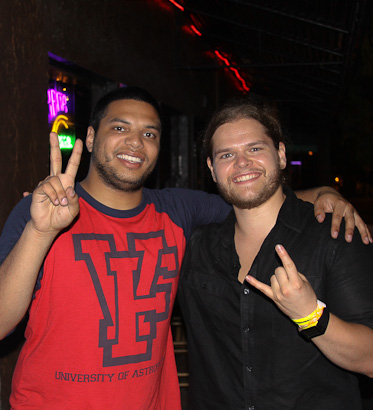
Misha Mansoor & Ivan Chopik
I was never crazy about Suhr Guitars… I was like “they’re expensive and they look beautiful,’ but I played Travis LeVrier’s [Scale The Summit] seven string that he got… it looks beautiful and I would have thought nothing of it. He sent me pictures of it and I was like ‘that’s a gorgeous guitar.’ I played it and immediately I was like ‘yes, this is awesome!’ and that to me is what’s more important than anything.
It’s spec’d out pretty differently from what I would get myself, but now it’s like, ‘oh man, I should try that,’ because I really liked that guitar… maybe that is part of what makes it…. That is definitely what I look for in a guitar and the brands that consistently put that out, those are the brands that I respect.
IC: You keep in touch with your fans, reading their questions and spending a lot of time getting them their answers. Is there anything that you’d like to share with them that maybe doesn’t come across in all those questions or at shows?
MM: I’m a sarcastic dude. You should probably never take anything I say too seriously. I see a lot of people getting offended at things that I say and I’m just like ‘Ok, I can see that,’ because it’s text and you really can’t convey emotion.
But I’m pretty sarcastic and I guess when I’m talking I hear it in my head and I’m like ‘that’s hilarious,’ but to someone else it probably doesn’t come off that way. Probably, you shouldn’t take anything I say too seriously for that reason, but I appreciate people who stay in touch. I like staying in touch with the fans… it’s something I’ve done since day one so at least for me, it doesn’t feel like a chore or anything like that. It’s just part of what I do.
IC: It’s probably what makes the whole experience a lot more personal.
MM: It’s a new way of doing things. I think a lot of older school bands don’t quite get that. For them it might be a chore, because they might be like ‘hey, I was doing things this way and it was totally fine and all of a sudden it’s not enough. What’s the deal?’ And that’s totally fair, it’s just the world changing under their feet but for me, that’s kind of how we came about, so that’s something that I enjoy.
[Special thanks to: Jeff Holcomb for his behind-the-scenes video footage, Adam Getgood for his outstanding photography, Joshua Weidling and DigitalTourBus.com for their detailed Periphery tour van footage, Lester Caballero for his in-depth transcription, Igor Stolarsky for his excellent audio editing.]
ARTIST LICK: JAKE BOWEN OF PERIPHERY PLAYS ‘LUCK AS A CONSTANT’ SOLO
July 31st, 2012 in Artist Licks by Ivan Chopik
[Jake's Ibanez Prestige 6-string guitar is tuned to Drop-C. Low to high: C G C F A D.]
LUCK AS A CONSTANT – 2ND SOLO (4:50 – 5:20)
With this solo I wanted to do something that was slightly shreddy, a little bit jazzy, a little bit flamboyant. It goes back and forth between two licks at a time.
BARS 1-2
I’m switching from a selective picking technique straight into full alternate picking when I get to the higher strings. It has this almost ‘rolling’ effect in the beginning – you roll your way to the top and then that’s where it starts getting a little bit shreddy and you’ll have to go into the alternate picking to make that happen and make the notes pop out.
BARS 3-6
This is the part of the solo where it gets almost ‘sarcastic’ sounding as Misha would always put it. There are these wild bends and [slides] going down the fretboard, followed by an almost octave-shape lick. It touches on the octaves, but there are also these other notes in there and it sounds almost like it’s clumsily going through to the next part, which is a much faster lick.
BARS 7-8
In the studio we had our good friend and now bass player for Periphery, Nolly [Getgood] – he was playing somePer Nilsson licks… I just thought some of the way that dude phrases stuff was really cool, so I was trying my own hand at it. That’s where I got the inspiration for this lick. It’s all tapping, but there’s a bend in it, that when you pull-off with your finger, you’re double-tapping the same note. It’s a very quick succession of notes.
BAR 9
Dimebag Darrell is a huge influence on my playing and one of the inspirations behind how bendy and wild this solo can be. I did this really gnarly bend with a tap, and that just kinda gives it that Great Southern Trendkill vibe.
BARS 11-12
Then it goes into another really playful set of notes that you wouldn’t necessarily anticipate. I really wanted it to be like ‘pretty – then crazy, pretty – then crazy.’ The last crazy part is this pull-off lick – I don’t really know how I came up with that. I was messing around playing licks and I thought I could fit that in in a neat place rhythmically.
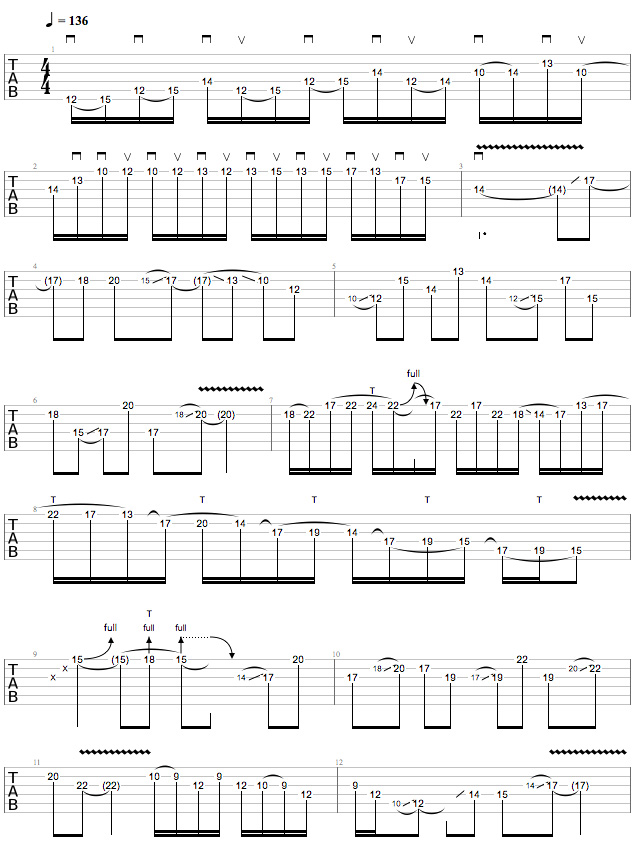
OUTRO HARMONY
I wanted to do a huge, epic Killswitch Engage‘y harmony. I guess when I was in the studio writing it, I was kinda thinking ‘what would Adam D. do? What would Adam D. and Joel do?’ And I did that! And that’s it – that’s the solo.
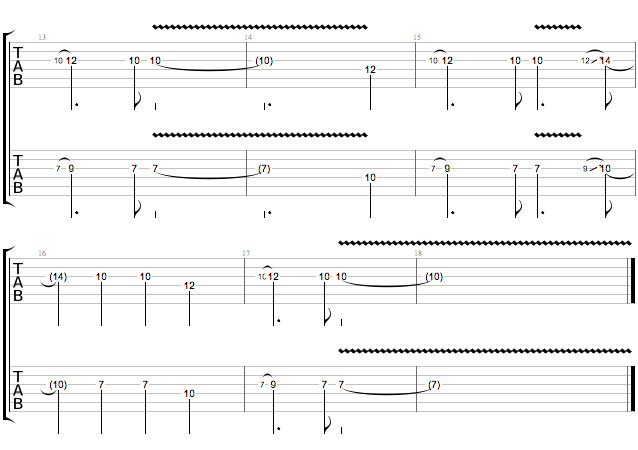
[Special thanks to Peter Boyle for his top-notch transcription work!]
THE FACELESS: WES HAUCH MASTERCLASS
July 31st, 2012 in Artist Masterclasses by Ivan Chopik
[Wes' guitar is tuned down a whole step for all examples in this Masterclass: D G C F A D]
E MINOR LICK
In this example, Wes plays a lick in the key of E minor, demonstrating his tasteful approach to phrasing and melodic note choice. Be sure to check out the varying rhythmic groupings found within the line, as well as the inclusion of the raised 7th degree from the Harmonic Minor scale and the strategically placed chromatic passing tones.
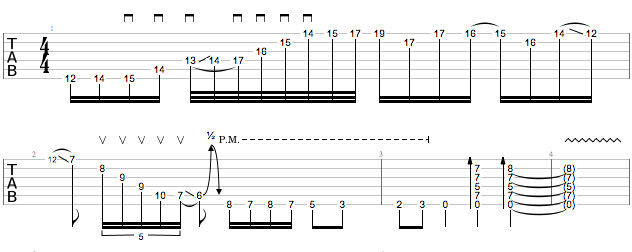
MILE ZERO (PERIPHERY) SOLO EXCERPT
Wes on his solo for Periphery’s “Mile Zero” from their album Periphery II: This Time It’s Personal:
“I recorded it with my friend Bali Harko (Ted Harkins), a tasty little Swede with white hot licks, godlike musical prowess that you would expect from a swede, and a penchant for saying stuff like “Ohhh maaaahhnnn” and it being funnier than it should be because of his accent. The guitar was my Bernie Rico Jr. 727 (A440) through Ted’s [Fractal] AxeFx Ultra. I have a Tremol-No on the Rico totally blocking and deadening the trem as a hard tail, so I didn’t use the bar for anything.
The last lick that everyone thinks is either a [Digitech] Whammy Pedal (don’t own one) or harmonics (that would be gnarly) is just a little descending sequence starting on the 27th fret (which is a high G when tuned to A440). The little chord vamp is basically Cmaj7 to Amin7 with some extensions that vary. [/dorkymusicstuff]“
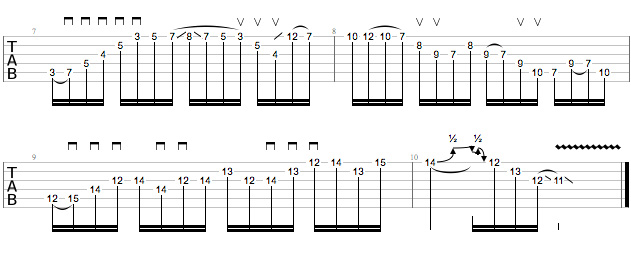
[Special thanks to Chris Robinson for his excellent camera work, Alon Mei-Tal for his spot-on transcriptions, and Chris Thomas for helping us out with camera gear on short notice!]
ARTIST RIFF: MARK HOLCOMB OF PERIPHERY PLAYS ‘MAKE TOTAL DESTROY’
July 31st, 2012 in Artist Licks by Ivan Chopik
[Mark's Ernie Ball Musicman John Petrucci Signature Model 7-string guitar is tuned to Drop-Ab.
Low to high: Ab Eb Ab Db Gb Bb Eb.]
Low to high: Ab Eb Ab Db Gb Bb Eb.]
MAKE TOTAL DESTROY SECOND VERSE RIFF (1:01 – 1:31)
I have this warm-up technique I do every once in a while before we play. It’s a six-note grouping and it’s just a series of hammer-on’s from open strings. I do that over and over again to limber up my fingers and I made a riff around this technique.
I also like to use a lot of open strings in riffs to add a little bit of a dynamic feel to them. The ending is just 3-note pull-offs to open strings and for the little tapping bit you’re basically just tapping in the same shape, just on different parts of the neck. Pretty simple, really!
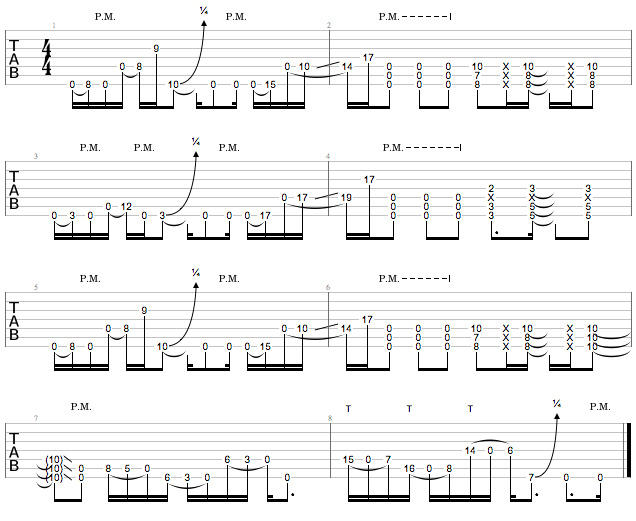
[Special thanks to Peter Boyle for his top-notch transcription work!]
PERIPHERY II: ‘THIS TIME IT’S PERSONAL’ OUT NOW
July 4th, 2012 in News by Ivan Chopik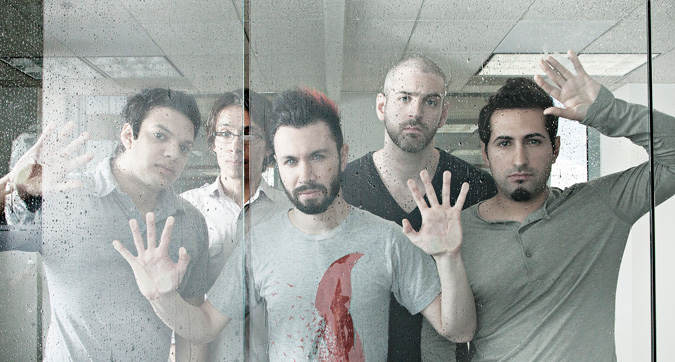
Combing the complex atypical rhythms and technical precision of math rock with the sensational brutality of progressive metal, Washington D.C’s PERIPHERY have redefined the boundaries of progressive music upon releasing their highly acclaimed self-titled worldwide debut. Guitar World boldly stated: “Misha Mansoor and PERIPHERY single-handedly created the progressive Djent rock revolution. Now everyone wants to get in on the act.”
The group’s highly acclaimed sophomore full-length release, PERIPHERY II, is available everywhere now and can be purchased digitally HERE. The group’s new video for “MAKE.TOTAL.DESTROY.” can be seen below:
Very rarely does a band come along that just defies the boundaries of conventionality, but the experimental, progressive metal outfit PERIPHERY have done just that and have blazed a trail of originality that has sent shockwaves throughout the metal world.
Be sure to check out the following Guitar Messenger features of Periphery:
Misha “Bulb” Mansoor Masterclass (Part 1)
Misha “Bulb” Mansoor Masterclass (Part 2)
Mark Holcomb Masterclass (Part 1)
Mark Holcomb Masterclass (Part 2)
MESHUGGAH – KOLOSS
March 30th, 2012 in CD/DVD, Reviews by Luke Dennis
Few bands can claim to be both mirror and hammer to the modern metal scene, at once reflecting the zeitgeist whilst forging its future. And yet Meshuggah have managed to do just that for two decades. For a band built up from relative obscurity in the early nineties, the savage Swedes have strayed little from their brand of esoteric thrash. Their success comes from the metal scene’s migration towards them, rather than the other way around.
As their death and grind peers exhausted themselves on the limits of speed and volume long ago, Meshuggah have proven to be an asymptote of modern metal – constantly rising, while never hitting the wall. With the release of Koloss, they’ve produced their most mature album to date. They’ve shattered the pale image of their imitators and hammered out a sound that saves detuned guitars from self-parody in one swift swing.
Believe it or not, the album itself even swings. Jens Kidman’s vocals cut through the sludge of album opener ‘I Am Colossus’ with a certain saunter. It’s immediately clear how much a twenty year investment in angular thrash can pay off. Just as smaller combos tested their talents and changed jazz forever by playing over the barline, meaty slabs like the aforementioned ‘I Am Colossus’ and ‘Behind the Sun’ coil tentacles around oblong rhythms in a new embrace. Detractors who may have not been able to dig their past out-of-bounds rhythmic acrobatics just may like the shade of this octopus garden.
This is not to say Koloss is Meshuggah’s most accessible offering, just their least obtuse thanks to a steelier swagger. Where their metric gymnastics once had the clattering cacophony of Optimus Prime falling down Mt. Everest, their efforts now sound like the boss Autobot surfing a tsunami atop an aircraft carrier.
While tracks like the killer ‘Break the Bones Whose Sinews Gave it Motion’ recall the slow churn of Nothing, this collection stands as the band’s most versatile offering yet, balancing break-neck assaults with down tempo groovy cuts that rarely bleed together. ‘The Demon’s Name is Surveillance’ hits the ground fast and furious, recalling the days of None. The barreling 4/4 charge, if less heady than we may have come to expect, enables an open string tapping blitz that spirals into their trademark Arctic air raid siren leads. This sustained dissonance, a longtime staple of Meshuggah, finds new real estate in the midrange of the guitar.
| ‘Break Those Bones Whose Sinews Gave It Motion’ music video. |
The bridge of ‘The Hurt That Finds You First’ hosts high-gained reverb howlings that soar and lurch like a scratched Explosions In The Sky record. Fredrik Thorendal andMårten Hagström finally make full use of their eight-string real estate with droning strings and pads whose lush overtones mesh with the guitar’s midrange. While their previous albums often relied on the harshly hollow divide between the rumbling lows and the piercing highs, the more even-handed mix shines a post-rock light upon the brutal drawl of ‘Do Not Look Down’ and ‘Swarm.’ This wider palate could have easily muddled their once stark sound, but instead the production of Koloss represents a new dawn in the darker tones of metal production.
Many of Meshuggah’s imitators have been engaged in a race to the bottom of the frequency spectrum, sometimes leaving the listeners to wonder if they’ve traded their guitars for high gauge rubber bands. As a result modern riffs have become dangerously close to losing tonality for the sake of a purely percussive quality (can anyone actually sing a djent riff?). Not so with Koloss, as the low riffs hit so precisely and deep that they could strike oil. The enhanced note saturation even lends richer overtones and harmonies to the slinging theme of ‘Marrow.’
The highest praise one could attribute to Koloss is just how organic it all feels. The current state of Meshuggah might be best depicted by how the band members’ faces emerge from the serpentine robes of the demon enthroned on the album’s cover art: they’ve merged as mere appendages to something more monstrous and fierce than the sum of their individual parts. For all of its impeccable production, surgical execution, and furrowed-brow brooding, Meshuggah makes the album’s writhing fireworks feel effortless. And for once, it seems like they’re actually having fun. Just check out the solo section of ‘Don’t Look Down’ where Hagström and Thorendal commit schizoid vacillations between Slash and Allan Holdsworth and try to not picture them grinning beneath waterfalls of sweat.
After the strenuous touring behind obZen pushed them to new peaks of their abilities, Koloss is the sound of an effortless rebirth, a band emerging from its mechanical carapace as a sleeker reflection of themselves. If djent is analogous to the hard bop days of the mid 50’s with every jazz band trying to outdo each other with spastic tempos and unbridled tenacity, think of Koloss as their own Kind of Blue, a cool recline after a flurry of exhausting endeavors. Meshuggah once again stake a higher ground in their established stomping ground. While this record no doubt commanded the pinnacle of their talents, it’s a long, organic exhale that stands as the new standard for metal in 2012.
EVAN BREWER INTERVIEW – THE FACELESS
March 22nd, 2012 in Interviews by Annie Grunwald Many of you know of Evan Brewer as the bassist for technical death metal band The Faceless, as well as for his collaboration with Tosin Abasi of Animals As Leaders in the band Reflux. In June 2011, Sumerian Records released his first solo album Alone, which consists entirely of bass guitars and showcases the unorthodox playing techniques that allowed him to create the album’s unique timbres and soundscapes.
Many of you know of Evan Brewer as the bassist for technical death metal band The Faceless, as well as for his collaboration with Tosin Abasi of Animals As Leaders in the band Reflux. In June 2011, Sumerian Records released his first solo album Alone, which consists entirely of bass guitars and showcases the unorthodox playing techniques that allowed him to create the album’s unique timbres and soundscapes.
I am honored to have had the opportunity to speak with Evan for the first ever bassist interview at Guitar Messenger. On March 22nd, we met up before his show with The Faceless in Worcester, MA, where he shared his thoughts about unique ways of sounding original on your instrument and how crucial it is to stay inspired as a musician. Amongst other things, I also learned of his life growing up as a musician in Nashville, as well as the projects he is involved with currently.
AG: You’ve been a member of The Faceless for about a year now. What is it like looking back?
EB: Kind of uneventful. We haven’t done that much in a year [laughs]. We’ve just been writing. We’ve toured Europe, done some stuff in the U.S. This is really the first U.S. tour we’ve done since I got into the band. It’s mostly been behind-the-scene stuff going on.
AG: How did you initially come upon the opportunity to play in The Faceless?
EB: Well, they needed a bass player, so they called me. I’ve known those guys since before they had a record deal. I was in a band called Reflux, and they used to open up for us in L.A. And so, I’ve known them, and we’ve been great friends for years.
AG: So you were already really acquainted with them and you were a fan of their music?
EB: Oh, yeah. I mean, aside from them having opened for the band Reflux, we did 4 U.S. tours with The Faceless when I was in Animosity. We’re just good friends, we’ve known each other for years, so it just made sense.
AG: That seems like a really easy transition.
EB: Yeah, it was a good fit. [We didn’t have] to go through that whole thing of hooking up with someone, and you may have a pretty good idea that you would connect musically, but you wouldn’t know if the personalities would mesh. So we didn’t have to worry about that, which made it easy.
AG: You’re a very dynamic bass player and you’ve set yourself apart from other metal bassists. Obviously, bass isn’t [typically] a lead instrument but you’ve made a point of showing that it can be. Can we expect any solo bass work on the upcoming The Faceless album?
| Click play above to watch the video of this interview. |
EB: No, not at all. I appreciate what you said, by the way, thank you very much!
AG: Of course. [laughs]
EB: But you know, that’s the beauty of doing a solo album – you can put those ideas there. I love doing the whole solo thing, I love using the bass in unorthodox ways. That’s a huge part about me as a player, but another huge part of me as a player is traditional bass playing. So it’s really nice having put all those ideas in that format, so that I don’t really have to do that stuff [with The Faceless].
There are going to be parts that will have interesting bass lines, of course, but they’re going to have a traditional bass playing approach. It’s nice having done the solo work, because then I can go back with a regular band and really enjoy just playing with my fingers or just outlining chords and walking bass lines, and not worry about cramming in all that flash with them.
AG: Would you say that you prefer playing in more of a band context, rhythmically keeping the band together, or would you more likely want to pursue a solo career?
EB: I’m not big into one or the other. I try not to set limitations for myself – I want to do both. I’ve come to terms with the fact that where I’m at as a player there’s not ever going to be one band that’s going to be the ultimate satisfying band, because I like to play multiple genres. There’s not going to ever be one project that will completely fulfill me, so it’s going to take a lot of musical interaction. If you really connected with a person and you loved being around that person and talking to them, you wouldn’t say ‘well, this is the only person I’m ever going to talk to ever again for the rest of my life.’ You would still want to interact with other people.
AG: Best of both worlds.
EB: Yeah, you’d still want to know other people and have other experiences. So for me, I’m always going to be a busy bee. I’ll be doing all sorts of stuff.
AG: I’m really curious as to what your influences were for your solo bass album Alone. Obviously, you’re not influenced by other solo bass albums – I think it’s so unique and I was just wondering like what kind of music and artists have influenced you to create that type of music.
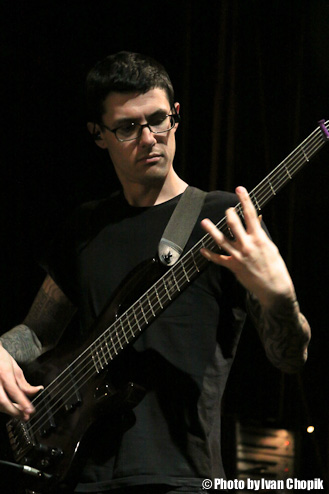 EB: Not bass players, really. You know, that’s what’s cool… it’s about taking other instruments you know and what you hear from another instrument and applying it to your instrument. It’s a very easy way to be original. So many people say they have a hard time finding their own voice and have a hard time being an individual, but to me it’s so easy. There are a million things you can do. Go learn a piano part and play it on your lap, like a piano – you know, play the bass here, the chords here, or flip your bass upside down or tune your bass weird or play an acoustic guitar part on the bass.
EB: Not bass players, really. You know, that’s what’s cool… it’s about taking other instruments you know and what you hear from another instrument and applying it to your instrument. It’s a very easy way to be original. So many people say they have a hard time finding their own voice and have a hard time being an individual, but to me it’s so easy. There are a million things you can do. Go learn a piano part and play it on your lap, like a piano – you know, play the bass here, the chords here, or flip your bass upside down or tune your bass weird or play an acoustic guitar part on the bass.
I could just sit here for all day and name a million different ways to be original, right off the bat. I always go outside of the instrument… If I hear a guitar player doing a crazy lead, I never say ‘well, I can’t do that.’ I’ve always been like ‘well, I want to be able to do that on my bass, who cares? It’s just a bass. There’s not any set way to play it. Just play it however.’
So, mostly I would say I’m not influenced by players, as much as the sound that the instruments make. I’ll hear a drummer and be like ‘how can I translate that,’ or I’ll hear a piano, or I’ll hear an acoustic guitar, or a style of playing, and I’ll say ‘I want to do that.’
AG: Was there any sampling or synthesis involved at all?
EB: Absolutely not on that album. Every sound on the album came from a bass guitar. So no other electronic elements, no other instruments, no other people were involved in the process in any way. Just me, a recording set up, and a bunch of basses. And that’s it.
AG: So is the tapping technique you use with both of your hands based on taking a piano part and playing it on your bass? Is that where that came from?
EB: Yeah, I think two-hand tapping on any instrument is roughly derived from a piano, but where it really becomes like a piano [is when you’re] splitting up the instruments. You can ring a chord and what would be tapped in front of the chord would mute these notes behind the tapping. But if you tap on a different instrument, this chord continues to ring, and you’re able to voice over it, without dampening the notes that you’re ringing behind it. That’s where you get into that voicing, because you can hit this note and sustain it and then play a solo over it like on piano.
AG: And it still resonates…
EB: Exactly. And that was the whole approach behind doing the two bass thing. And it’s a really useful tool. It looks crazy of course, but it’s not a show-off thing. It’s a very practical thing. I plan on doing a lot more of that stuff. To me that’s real. That’s hitting on what I’m into right now, creatively. I really like that approach… I suggest if anybody’s got two instruments laying around, you should mess with it, because it’s very fun.
AG: Did you start out as a bass player or a piano player?
EB: I’ve always been a bassist. I was never into guitar at all. I’m kind of getting into guitar now a little bit. It’s really fun. I got an acoustic guitar, so I like it. It’s a cool instrument, but I’ve just always been a bass player, since day 1.
AG: Did you take private lessons or any sort of formal instruction or did you mostly start playing on your own and experimenting?
EB: Well, I got very lucky. I’m from Nashville, Tennessee, and there’s a very eclectic music scene there. At a pretty young age, probably about 3 or 4 years into playing, I was already doing quite a bit with the bass, quite a bit for a young kid, and someone hooked me up with Reggie Wooten, the oldest brother of the Wooten brothers. He’s the guitar player and he taught all of them how to play their instruments. Hooking up with him from an early age, we became very close. We’re still very close friends and we would play all the time.
Being around those Wooten guys and that whole community at a very young age set the bar extremely high. They were doing extreme things with their instruments, but it became very normal. You know, you’re sort of a product of your environment. If you’ve never heard someone speak English, you’re not just going to be able to speak English out of nowhere, having never even heard the language.
It came to where some guy playing like this and doing all this crazy stuff was completely routine and normal for me growing up. That experience really created what you see now in a large part and there was also a lot of independent study in correlation with that. Also, if I ever saw a player I really respected or liked, I would just go out of my way to connect with them and get private lessons with them or even just pick their brain.
AG: So did that force you to want to get better or improve yourself?
EB: Well, I don’t know if that necessarily had much play in what I do on my instrument, but what it did, is it gave me a profound respect for what it means to be an artist. If you have someone that cares about what you do, it taught me to take that very seriously. It taught me, if someone comes up to me and wants to talk to me, to make time for them. You can actually make a big difference in someone’s life by showing them a few things, just taking two minutes out of your day.
It’s like ‘who am I?’ to get off stage and then go up to the dressing room and sit there alone. I’d rather just talk to people, you know? So that’s what I learned from that experience. But I suggest, kids or any player, however old you are, if there’s someone you respect, reach out to them. These days it’s even easier with all the social media to actually connect with the people whose brain you want to pick and actually ask them questions.
AG: You went on tour with Animals As Leaders [in support of] your solo bass album. I’ve never really seen a solo artist just come out and play during a metal show like that. What was the crowd response like and what was that experience like for you?
EB: Completely amazing. It was unbelievable. I knew it was going to go well… I just went into it with that attitude, so I felt like that’s what was going to happen and it went amazingly. People were completely engaged the whole time. It’s tough to put together a show that’s going to have a good flow when it’s just you, but it went really well.
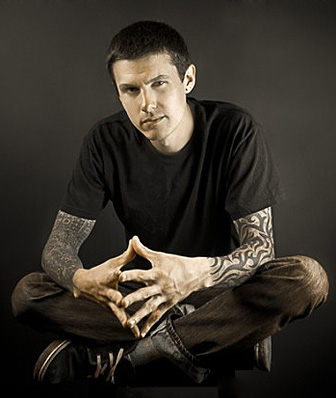
It was fun being out with them. We’ve been good friends and I was in a band with the guitar player of Animals As Leaders [Tosin Abasi], I was in a different band with the [former] drummer of Animals As Leaders [Navene Koperweis], so the only one I had not actually been in a band with was Javier [Reyes, guitar].
So already knowing those guys, I was riding with them, and it was basically like a reunion of sorts. So it was fun on multiple levels. I also grew a lot as a player doing that solo stuff. I still perform that [material] and have desire to do so a lot more. That tour was very productive for me.
AG: What other sorts of projects were you in prior to joining The Faceless?
EB: Well, I was in the band with Tosin, the Animals As Leaders dude, called Reflux.
AG: Was it a metal band?
EB: Yeah. We kind of like honed some of our skills together. That time, more than what we did with the band, for me and him, individually, it was about being in the same room together and bouncing ideas off each other. It was productive – he got a lot from me, I got a lot from him. After that I was in Animosity from San Francisco, and that was with [Navene Koperweis].
Growing up I did a ton of freelance work around Nashville. That’s where I really honed the musicality aspect of what I do… how I learned how to play music. I think so often heavy music is riff based and you can get by without actually knowing anything about music, does that make sense?
AG: That’s very true. I definitely hear you on that.
EB: The time in Nashville was the main development as far as melody, rhythm, and harmony, musicality, and also chops went. I was forced into a lot of situations where maybe I’d go out somewhere and be asked to sit in at a particular style gig… country, jazz, R&B, funk, and would be forced out of my comfort zone at a very early age. It taught me that I needed to be well rounded. In that city you almost have to be well rounded. So those experiences were vital.
Now I have this solo bass thing, obviously, and I also have a project where I write all the music and produce. It’s with a singer named Barry Donegan – his band is called Look What I Did. The project is called Climaxes. We have like a whole album of material, but it’s just sitting around and we don’t know what we’re going to do with it yet. If we don’t put it out with a label, we’ll probably just put it up for free or something. But it’s really cool and it’s fun working with singers – they’re just a different take on the whole thing. And then I got a few other things in the works… got like four new solo songs I’m working on right now.
AG: It sounds like Nashville is a place to just really get all sorts of opportunities in music. Would you encourage other musicians to go to Nashville and kind of delve into that? Does that make sense, or do you think in other places it could be the same?
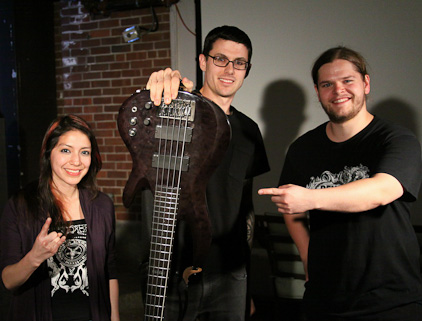
Annie Grunwald, Evan Brewer, Ivan Chopik
EB: I don’t think that Nashville has had a lot of musical opportunities for me in terms of gigs and work. All my stuff has come outside of that city for whatever reason. What it has had for me is a lot of opportunities early on to grow and to learn from people. There’s a wealth of knowledge there.
I would suggest if you wanted to go there for a little while and try to learn from people, that it would be a very good place to do that. If you’re going to try to get gigs, it depends on what you’re trying to do… I mean, it may work for you, but it didn’t really work for me.
AG: But you learned and were able to gain a lot of knowledge from the people that lived there.
EB: Absolutely. It’s a very, very, nice place. It’s worth going, for sure, and checking out. If you go [to audience], contact me and we can maybe meet up.
AG: Do you have any advice for bass players to get to the point where you are and be able to tour and release an album?
EB: I don’t know if I have advice for bass players or even really musicians, as much as just people or artists in general. My advice would be to seek inspiration, actively seek out things to inspire you. If you don’t have a fire or a passion you’re only going to go so far. For me it was very important and it’s still very important to reach out, play all the time with different players, try really hard to find inspiration, scour the Internet for people that are doing cool stuff, go out, look for people who are interesting, pick their brain, talk to them, get into conversations with them.
I think everything about being an artist requires inspiration. For you to have conviction in your music, for you to be productive, and crank out a lot of material and have it be something that’s going to be infectious and people are going to enjoy, you have to be inspired about what you do. So however you get it, just get it, that’s the most important part. That’s my advice.
[Special thanks to Chris Robinson for his excellent camera work, Chris Thomas for helping us out with camera gear on short notice, and Cigar Masters of Worcester, MA for their warm hospitality.]
MARC OKUBO INTERVIEW – VEIL OF MAYA (2012)
February 29th, 2012 in Interviews by Ivan Chopik Since their inception in 2004, Chicago’s Veil Of Maya have established themselves as one of the premier bands in today’s modern metal scene. With the release of Eclipse, their third full-length album and most concise offering to date, the group has further broadened their explosive brand of progressive metal.
Since their inception in 2004, Chicago’s Veil Of Maya have established themselves as one of the premier bands in today’s modern metal scene. With the release of Eclipse, their third full-length album and most concise offering to date, the group has further broadened their explosive brand of progressive metal.
In our November 2010 interview between Veil Of Maya’s own Marc Okubo and Periphery’s Misha Mansoor, the two axe-slingers had set a goal of working on a musical collaboration in the near future. The notion was realized on Eclipse, withMisha joining forces as producer and adding his own touch to Veil Of Maya’s signature twist of jarring riffs and captivating melodic hooks. I met up with Marc in Worcester, MA, during his recent tour with In Flames, Trivium, and Kyng:
IC: This tour features a very diverse lineup. Veil Of Maya stands out as the more modern sounding band on the bill. What’s that like for you guys?
MO: It’s actually working out really well, because In Flames and Trivium have very open-minded fans that are just coming out to have a good time and experience a metal show. Kyng and us are both very different bands so we’re pretty much just making new fans every night. It’s been awesome.
IC: Have you been playing any of the new material from Eclipse?
MO: We’ve been playing a new intro and a new song called ‘Punisher’ on this tour. We’re planning on that one being the crowd-pleaser.
IC: Speaking of ‘Punisher,’ the song’s last riff is introduced by ‘All they have is just bao-nuh, bao-duh-nuh-nao, we-neh-nuh-nah-nuh-neh-no.’ How did that bit come about?
MO: Before we went to record, my friends posted this video of some kid trying to make fun of Periphery and just saying all the stuff that didn’t make any sense… like he’s talking about something called ‘duh-jent’ music. When he’s making fun of Periphery he says ‘All they have is just bao-duh… ,’ and I was like ‘Oh my god. He just posted that online. So awesome. I’m taking it.’
IC: Throughout your previous album, [id], there was an underlying theme. Was there a concept behind Eclipse?
MO: Well, the album title was inspired by a girl that I met in Italy who was blind half her life. She wandered off and accidentally stared at an eclipse and gained her eyesight. She could see to the point where she could drive me around. It was pretty awesome. She told me that and it just kind of blew my mind, you know? I can’t even imagine what it would be like, to get used to living a certain way and just be granted a whole other sense. So I had that in the back of my head when I was writing the music. Her story inspired the music.
But lyrically, it’s all Brandon. His lyrics are mostly open to interpretation. You know, some of them are a bit more personal than others, but we like to make it so that the lyrics can mean something for everyone, not just for him.
IC: Wow! Did this story inspire the album artwork, as well? Who designed the artwork?
MO: Yup, the artwork and everything. Daniel McBride, Sumerian’s artist.
IC: When did the material for Eclipse start coming together?
MO: We took the summer off from touring, so that we could write and record with Misha. We were originally planning on doing Summer Slaughter 2011, but we decided to do the album instead and I think we made a good decision.
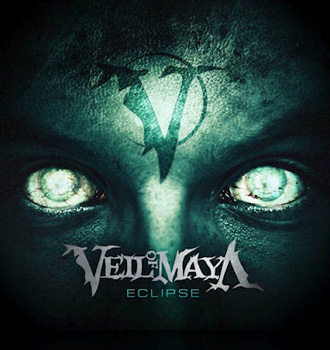
Veil Of Maya - Eclipse
IC: At which point did Misha come into the equation?
MO: We had always expressed interest in working together on something, whether it be for Veil Of Maya or not. We were already in talks, so we just set the plan around his touring schedule and our touring schedule. Michael Keene [producer of VoM’s previous two LPs and guitarist for The Faceless] was obviously working on the new Faceless album, so we just wanted to let him do that.
We did a sample track with Misha right before we played The Bamboozle [annual New Jersey festival], which turned out really well and became ‘Divided Paths.’ People that have a really keen ear might be able to tell a slight difference in guitar tone because we used the[Fractal Audio] Axe-Fx Ultra on that song and the T. Smith guitar, and then we used the Axe-Fx II on the rest of the songs.
IC: Is that your live rig right now, the Axe-Fx?
MO: Yeah, the Ultra.
IC: Are you running it through a power amp?
MO: Yeah, I’m running the [Randall] V2 as a power amp.
IC: Eclipse features a number of synth textures and melodies. How do you incorporate those into the live show? Do you have tracks and a click playing with you?
MO: This is the album where we’re gonna start trying to play to a click and have everything all synced up and just focus on putting on the show. We’re even talking about having a MacBook sync up with the Axe-Fx to do my effects changes for me, so I’m not constantly tap dancing like I usually am. That’s the goal. I still haven’t been able to fully program all that yet. We’re going to see which songs we’re gonna play live, that we would need to do it on first. That’s one of our ideas for playing the new stuff.
IC: You’re known for using a looper to help out with some of those layered guitar parts. Are you now using the looper within the Axe-Fx?
MO: I actually don’t use the Axe-Fx effects at this point. I just use it for my tone and then I use the same pedals that I’ve always used. I’m still looping live at this point and turning on and off harmonies with my effects pedals. Hopefully, in the future we can still have some loops, but the rest of the effects will be set up by a computer going into the Axe-Fx or something.
IC: What was your mindset going into this album? Was there a particular goal that you were looking to accomplish?
MO: Well, we just wanted it to be over the top. We wanted it to be our most focused, straight-to-the-point album, epic and progressive and aggressive. Did I say progressive? [laughs]
IC: When you were discussing labels like ‘Djent’ and ‘Sumeriancore’ during our previous interview with you and Misha, I think you guys settled on ‘progressive aggressive’ as the most appropriate title for what you do…

MO: Yeah, that’s definitely what this album is. It’s definitely got both of those elements and having Misha work with me on it was really awesome. I think that he’s a genius and anything that he could do to help us is always welcome.
IC: How much did he change the album or add to the album? What parts of it are very ‘Misha’ versus very ‘Marc’?
MO: We wanted it to be somewhat of a collaboration. With the demo track [‘Divide Paths’] that we did together, I didn’t really have a full song written at that point. I had most of the song done, and I was just like ‘let’s mess around with it and see what happens.’ He was always just able to suck ideas out of my brain. We could just talk about something and he would know exactly how to just suck it right out and be able to play it on first try. We were just on the same level with what we wanted for the CD.
I wrote a different riff or set of riffs every day and just made a riff bank. Then I brought all these little clips to Misha and we just turned them into songs. He definitely helped write parts too, you know? Misha wrote parts and played guitar on it, and we just wrote it together. It all was based off my riffs and then I would have the final say, you know? I would be like ‘this part needs to be a thrash beat with a mathy part, and then we need to have synths doubling this’ and he would just be on it and it’d be done instantly. So it was really fun.
IC: Speaking of the synths doubling lines, I noticed that that’s something that is more pronounced on this album. The Final Fantasy soundtrack comes to mind at some of those moments. Was that an influence at all?
MO: Oh yeah, definitely! We made mocking titles for all the songs first and ‘Eclipse’ was called ‘The Last Reverie,’ which is a synonym for Final Fantasy. We were like ‘that’s totally the Final Fantasy song! We’re gonna leave it instrumental, it’s gonna be super epic!’
IC: That’s awesome. What were some other influences for Eclipse?
MO: When I was writing, I didn’t really listen to very much music, because I was just trying to force as many ideas out of my brain as I could, you know? With your first album you have infinite amount of time pretty much, and then every album after that it’s just shorter. Your fans have a shorter attention span. They want something better than you’ve ever written and they want it right now. So I was just kind of destroying my brain trying to make as much music as I could.
But what I listened to when I wasn’t trying to write would be bands like The Reign of Kindo, The Dear Hunter, which I like a lot, and of course all my friends’ bands, all the Sumerian [Records] bands…
I also like movie soundtracks a lot, like the E.T. soundtrack. I think I watched like every Marvel Comics movie ever made, while I was trying to think of ideas. You know that piano part in ‘Vicious Circles’? I was totally watching the part in Spiderman 3 when Peter Parker’s friend dies. It’s like ‘oh man, I’m totally making that a part!’ That’s honestly the kind of stuff that would be going through my head when I was writing those parts.
IC: Can you tell us a little more about the actual recording process at Misha’s place?
MO: We would start working with the guitars and then we would try different ideas out with drums and bass through MIDI. Then we’d just retrack everything after we were happy with it, and make it sound like a real band playing.
IC: Were the drums tracked with a live kit or were they triggered from an electronic kit?
MO: It’s like a combination of things I’d say. We definitely did utilize Superior Drummer [Toontrack percussion VST] but Sam [Applebaum, drummer] was right there for all of it. We would change things as a band and then track it afterwards. Originally, we did all the songs with keyboard bass, just because we were writing it so quickly, and then we would do all of it with the real deal to make it sound legit.

IC: Were the vocals tracked at Misha’s as well?
MO: Michael Keene actually tracked the vocals and helped Brandon [Butler, singer] with the patterns and stuff like that.
IC: I think the vocals have come quite a long way from previous records. It’s a real step up on this album.
MO: Yeah, that’s not the mixing, that’s actually Brandon improving as a vocalist throughout the years, getting a lot of experience. He stepped it up for sure.
IC: Who mixed and mastered the album?
MO: Misha did both. Keene produced the vocals and gave his final mix of the vocals to Misha and then Misha placed them on the master and mixed it all.
IC: What’s something you anticipated that you might get asked about the new record, but so far you haven’t?
MO: Well, the one that a lot of people are most upset about is the length of the CD. I mean I have been asked about that, but I just want to clear it up that we are aware of how long our CD is, and so is Misha. We just wrote and recorded an album to the point where we thought it was complete. So we were happy with the length of it. We didn’t feel it was necessary to put a bunch of instrumental dubstep songs in between every track to make our album forty-five minutes long.
We just wanted it to be a straight, to-the-point Veil Of Maya album and I think that’s what is. So if you’re actually not paying attention to the length of the CD, you’ll get a full album experience I think. That’s one of the things I’m going to have to explain a lot, I guess. But also we plan on writing as soon as possible, so we are not going to just stop with this album.
IC: What are your plans for the rest of the year?
MO: I, personally, would like to be able to put out another EP before the year is over, but I don’t know how realistic that is. I’m going to try my best! I think our fans have ADD and they always need something new. I want to stay on top of that, because I also have ADD.
IC: Any closing words for Veil Of Maya fans everywhere?
MO: If you torrent our CD, you should at least check out the real copy and see what it looks like. Show it to your friends and be like ‘man, that’s pretty cool looking!’ A lot of people put a lot of work into it and not just the band, but everyone involved deserves for you to experience the entire package.
Stay tuned for Guitar Messenger’s review of ECLIPSE, featuring a detailed track-by-track commentary from Marc!
[Special thanks to Tine Colle & Kaley Nelson for their wonderful photography!]
VEIL OF MAYA – ECLIPSE (FEATURING TRACK-BY-TRACK COMMENTARY FROM MARC OKUBO)
February 11th, 2012 in CD/DVD, Reviews by Luke Dennis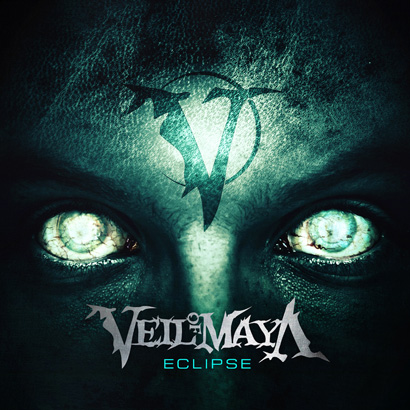
Veil Of Maya – Eclipse
Let’s get one thing out of the way: how you regard Veil of Maya and their Sumerian brethren likely runs parallel to your impressions of Meshuggah. Of course it wasn’t until a few years ago that anyone bothered to stamp this brand of arrhythmic metal with a name as monosyllabically demeaning as ‘djent.’
But as the outer rims of metal took the genre to new depths of speed, volume, and atonality, it was only a matter of time before bands went back to the vintage brewed up by the spastic Swedes in the 90’s and decided they liked the Kool-Aid. And much like the debut of Stravinsky’s ‘Le Sacre du Printemps,’ it was only a matter of a time before the public palate developed a thirst for it.
While it only took a year for Stravinsky to go from being chased out of concert halls by a mob to being carried out upon their lauding shoulders, Veil of Maya have been tinkering with their modern take on metal for a little under a decade now.
With the recent release of their fourth album Eclipse and their subsequent tour with modern metal stalwarts In Flames and Trivium, they’re ready for the main stage. Simply put, Eclipse is the cutting edge of modern metal: abrasive, punishing, relentless, and yet so smooth.
Nonstop touring after 2010’s [id] has greased the quartet into a well-oiled machine. Brandon Butler has split his pipes into a yin and yang yell, capable of leaping from spitfire scream to guttural bellow at will. Beneath such vocal dexterity on ‘Divide Paths,’ Sam Applebaum pounds out frantic meter changes with brutal conviction. ‘Punisher’ is just as abusive as its name implies, up until it employs one of the slyest samples on this side of hip-hop. A sophomoric youtube criticism of Periphery inspires a breakdown that would make Dimebag Darrell smile a black-tooth grin.
The greatest departure from their past work lies in the slick production. This should be of no detriment to any old-time VoM fans as the hand at the board belongs to none other than Periphery’s Misha ‘Bulb’ Mansoor. Mansoor acts here like a fifth member, whetting each instrument to cut through the mix like a surgeon’s scalpel and judiciously anesthetizing with a dose of pads and synths to sooth. Lest purists decry this added dimension as a feeble attempt to go prog, rest assured the samples are subtle and grant the furious pace a sense of breath as in ‘Winter is Coming Soon.’ Here a feigned release lulls the listener before a parry of blast beats reminds you just what kind of business these guys mean.
Marc Okubo’s compositions remain ruthlessly efficient, never toeing the tides of indulgence (only the final song stretches past the four minute mark). His tenacious guitar lines skitter over the frets like a steel-toed spider, while his siren solos remain a humble homage to the stylings of Meshuggah.
If there’s one gripe to be had with Eclipse, it’s the overuse of synths on the back half of the album. While never egregiously cheesy, it still undermines the aggressive aesthetic laid out in the front end. If the first half is like being overrun by a brood of Lovecraft nightmares, then the last half is like getting kicked in the shin by a band of leprechauns. It’s a shame, because the synths don’t do much more than play lines that could easily be done with guitar (‘Vicious Cycles’) or double existing guitar lines (‘Numerical Scheme’). In no way does this detract from the album’s merits. Rather it suggests Veil of Maya may be best experienced as a live band than as a studio project. But Eclipse remains a portent of what’s still to come from this talented young band. Be sure to keep these guys on your radar, because they’re sure to only get bigger and badder.
MARC OKUBO’S TRACK-BY-TRACK COMMENTARY ON ECLIPSE
During our meeting on February 29th, 2012, Marc Okubo agreed to finish off his interview for Guitar Messengerwith an exclusive track-by-track commentary of Eclipse:
1. 20/200
“It’s like an intro. We’ve been playing ‘Martyrs’ off of [id] for our intro live and we wanted to have a new aggressive heavy intro to start our set with and ‘20/200’ is just that.”
2. Divide Paths
“That’s the demo song we did with Misha before we actually started recording the CD. We were really happy with it, so that’s why we wanted to continue with Misha.”
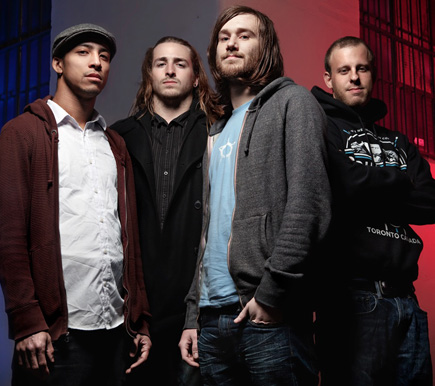
Veil Of Maya – Eclipse
3. Punisher
“‘Punisher’ was a song that I had pretty much completely finished aside from the ending part, which was inspired by a certain YouTube video.”
4. Winter Is Coming Soon
“That song was actually a B-side fromThe Common Man’s Collapse. We ended up taking the groovy parts out of that song and making ‘Pillars.’ Misha heard me jamming on it, because it was just stuff that I had unrecorded.
So we tracked the parts that we had remaining from that song. I think there’s another part of that song in a different track, too. And then we added some new parts and made it an actual song. It doesn’t have any breakdowns, so djent that!”
5. The Glass Slide
“‘The Glass Slide’ has a bit of a ‘Mowgli,’ ‘Uprising’ kind of vibe to it. It’s not the same riff by any means, but a lot of people will compare it to that. That sound is just a Veil of Maya trademark. Honestly, I don’t know what the title refers to. We were going through all of our songs and they all had fake names before and we took lyric segments for names. I think the fake name for this one was ‘The Third Uprising,’ because ‘Mowgli’ was the ‘Second Uprising.’”
6. Enter My Dreams
“I wrote a lot of death metal riffs and lot of them didn’t even get used on the CD. It was just what was naturally coming out of my brain I guess, and that’s definitely one of the more death metal sounding ones. Misha did a guitar solo on that one. See if you can guess which one is him and which one’s me.”
7. Numerical Scheme
“‘Numerical Scheme’ was a song that I had mostly written already, but then when we went in there and started tracking it, we were just like ‘we need something else. We need like a super-crazy melody!’ I just wrote the super-melodic technical parts on the spot with that. Misha was super into it, so we wrote that one really quickly, almost starting with nothing. We just put it together and it came out really awesome.”
8. Vicious Circles
“That was a song that I had all the essential riffs written for, but I just didn’t have them all put together. Misha helped me organize the parts, and made it all one song. That was the song that has the Spiderman part!”
9. Eclipse
“This is the Final Fantasy reference. I actually didn’t intend on putting that song on the CD, it was just something I was just kind of jamming on and Misha heard it and was like ‘you have to put that on the CD. I’m making you!’ He was very passionate about that. It came out really awesome, so I’m glad he did make me go through with it and helped put it together.”
10. With Passion and Power
It’s like the super-technical death metal song on the CD for me. That’s one of our favorite songs to play. We’re working on playing it live right now. It’s one of our favorite songs to practice to, at least. That’s just like the future of what we’re going for. It’s not like it’s super-aggressive, it’s not really super-groovy the whole time, it’s more just technical and in-your-face. That one’s secret name was ‘The Last Song’ ‘cause of the fadeout at the end. We always intended on that being the last song of the CD.” (April 17, 2012)
PERIPHERY PART WAYS WITH ALEX BOIS
July 6th, 2011 in News by Ivan Chopik
Alex Bois
Earlier today Periphery have issued the following announcement on their Facebook and MySpace pages:
Hey Guys!We have some sad news to share. Alex Bois and Periphery have decided to part ways. This is truly a sad day for Periphery, because Alex has been with us since the beginning, and he is like a brother to us. We’re going to do everything we can to make the most out of this unfortunate situation, and soldier on like we always have in the past when faced with setbacks.In regards to all of our upcoming shows and tours, worry not! We will have special guest artists filling in for Alex, so our touring plans will not be changing whatsoever.Throughout all of this, we really appreciate your support and understanding.See you soon- Periphery
PERIPHERY RELEASES ICARUS EP, POSTS WEBISODE & ANNOUNCES DRUM PERFORMANCE
April 19th, 2011 in News by Ivan Chopik
There is no doubt that PERIPHERY are innovators, and guitarist Misha Mansoor is being hailed by industry experts and his peers as one of the main purveyors of this current Djent movement that is feverishly spreading throughout the progressive circles. Check out the new issue of Guitar World on stands now to view the band’s striking five-page feature and to view a special instructional lesson series with Misha that can only be accessed via the CD Rom in the magazine.
The group’s much anticipated new Icarus EP is now available in stores everywhere. This offering features a brand new unreleased track, bonus tracks from their previous album, a series of remixes and video clips. Its official track listing is below. Also, watch above or click on the link below to check out a new video interview where Mansoor and Jake Bowen (guitars) describe how this EP came together:
http://youtu.be/Y7WZ-TDNy0k?hd=1
http://youtu.be/Y7WZ-TDNy0k?hd=1
Bowen states: “We are very excited to unleash the new Icarus EP on the world. It’s been a very busy year for us so far and we hope the EP will hold everyone over until we finish writing and recording our new record.
“In show news, we’re excited to say that we’ve been given the great opportunity to play this year’s Sonisphere Festival in the UK. Needless to say, we’re very stoked to go back to the UK to play for fans old and new, and to share the stage with some of the world’s greatest bands.
“We’re also extremely grateful to have such strong support from all of our friends at Guitar World – make sure you check out the newest issue to see what gear we’re using and read what they have to say about the “Djent” movement. Matt Halpern, our drummer, will also be appearing and performing live on drumchannel.com withTerry Bozzio on April 29th at 4pm PST, so make sure to log on for that.
“It’s crazy to see 2011 is moving so fast, but there is plenty more in store for PERIPHERY coming soon. Keep your eyes peeled and ears open! Talk soon.”
Halpern further comments: “I couldn’t be more excited for this amazing opportunity to hang out and jam with one of the best drummers that has ever lived. I’ve followed drumchannel.com and Terry Bozzio for a long time now, and I’m humbled to be performing in the same studio as some of the greatest drummers who have ever lived. Terry, who will be hosting the broadcast, is one of the most well known, super creative and insanely well respected drummers in the world. I’ve sat down and traded licks with tons of amazing drummers over the years, but I gotta say, i’m REALLY looking forward to this one! Make sure you tune in to drumchannel.com, next Friday, April 29th at 4PM PST (7PM EST) for the free live performance.”
Very rarely does a band come along that defies the boundaries of conventionality, but the experimental, progressive metal outfit PERIPHERY have done just that and have blazed a trail of originality that has sent a shockwave throughout the metal world. Head over to www.facebook.com/peripheryband for additional information.
THE ICARUS LIVES EP – OFFICIAL TRACK LISTING
Songs:
New Groove (Instrumental)
Icarus Lives
Icarus Lives – Fan/Contest Winner Remix
Icarus Lives – Zedd Remix
Icarus Lives – Bulb Remix
Jetpacks Was Yes v2.0
Captain On
Frak The Gods
Eureka
New Groove (Instrumental)
Icarus Lives
Icarus Lives – Fan/Contest Winner Remix
Icarus Lives – Zedd Remix
Icarus Lives – Bulb Remix
Jetpacks Was Yes v2.0
Captain On
Frak The Gods
Eureka
Videos:
Icarus Lives
Jetpacks Was Yes v2.0
+ Icarus Lives behind the scenes footage
Icarus Lives
Jetpacks Was Yes v2.0
+ Icarus Lives behind the scenes footage
'via Blog this'
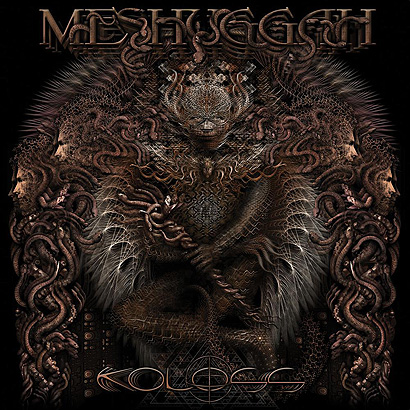
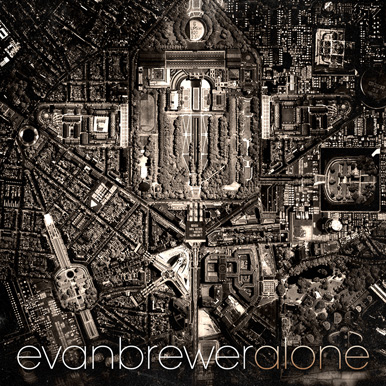
No comments:
Post a Comment